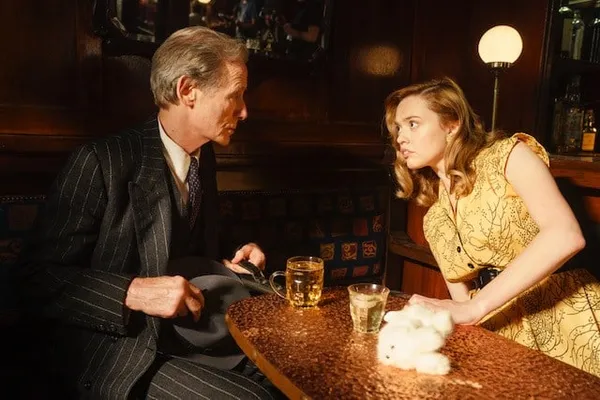Eye For Film >> Movies >> Living (2022) Film Review
Living
Reviewed by: Amber Wilkinson

Film critics don't like to talk about it much, but almost all of us have some films that are considered "classics" which we haven't yet seen. Ikiru is one of mine, so I came to Oliver Hermanus's new film - adapted from Akira Kurosawa's film by Kazuro Ishiguro - as a blank slate. The following review, therefore, will be confined to considering the film on its own merits rather than comparison, which I'm sure you won't have any trouble finding elsewhere.
This story - of a civil servant whose life shifts on its access after he is told he is terminally ill - slots into 1950s London like a smart cotton sock into a well polished shoe. The upheaval and chaos of war have been largely replaced by an almost metronomic attention to timings, the uniform of work and repetition for many, their muted suits in sharp contrast to eye-popping Kodachrome-style colours that are used elsewhere and that help fully immerse us in the time period. As we see the suited souls line up at the station for their morning ritual of catching the train to the city - nodding to their boss Mr Williams (Bill Nighy) but not sitting in the same carriage - it's hard not to think of TS Elliot's Waste Land, "A crowd flowed over London Bridge, so many, I had not thought death had undone so many".

A sort of "death" has already come to Mr Williams even before his diagnosis - we find out later that the sole woman, Miss Harris (Aimee Lou Wood), who works in his office has nicknamed him Mr Zombie - paper pushing and weaving a wall of bureaucracy that people, like a group of women who want to turn a bomb site into a playground, find hard to surmount. Nighy imbues Williams with an earnest melancholy that carries just the whisper of remembered happiness. Something of those happier moments is, perhaps, reflected in his office's latest recruit Mr Wakeling (Alex Sharp), whose initial eagerness is positively frowned upon by his new colleagues who are, with the exception of the spirited Miss Harris, already urging him to get in the grey groove with them. But Mr Williams has long since fallen in step, with even his home life shorn of spirit, thanks to the earlier loss of his wife and the buttoned up nature of his relationship with his son and daughter-in-law.
The diagnosis and a couple of unexpected encounters change things. First there's a night out on the tiles with Mr Sutherland (Tom Burke, who evokes effortless loucheness with the ease of Rupert Everett) a man he meets in a cafe, an evening that will cause Mr Williams to look backwards, while bumping into Miss Harris, who has since left his office for new employment, offers him something very unanticipated - a thirst for achieving something in whatever future he has left.
There's a burnished glory to the first half of the film that carefully evokes the time period via production design by Helen Scott that's so polished you can almost smell the beeswax, and costuming from Sandy Powell that suggests a world on the cusp of a colourless past and brighter future, all pulsed through with delicacy as Nighy subtly shifts gears.
The deliberate airlessness - which finds contrast in the likes of Miss Harris' joy at her first knickerbocker glory - works well initially, but as Nighy has less screen time and the film slips into considerations of the switch in Williams' life in the past tense, it drifts towards the stagey, with an encounter Mr Wakeling has with a policeman, in particular, feeling much less connected to the carefully evoked 'real world' of the film than all that has gone before. The music form Emilie Levienaise-Farrouch is also laid on too thickly in places, particularly during a key speech from Mr Williams, when it detracts from the gentle magnetism of Nighy's performance. By the end, there's a lingering admiration for the craft and moody melancholy but the deeper emotions remain at arm's length.
Reviewed on: 22 Jan 2022

















